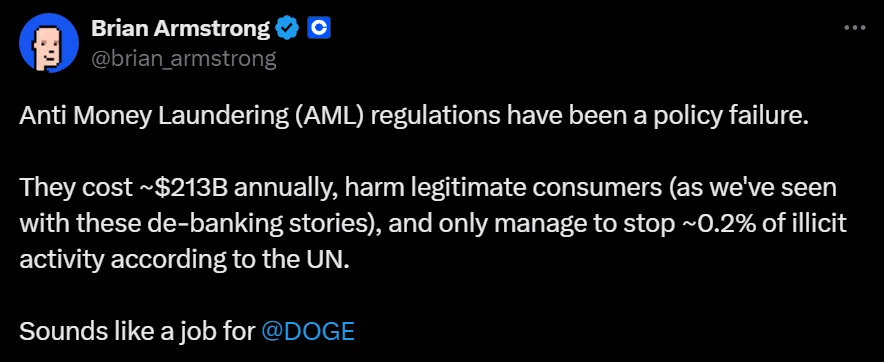On December 2, 2024, Brian Armstrong, the CEO of cryptocurrency exchange Coinbase, took to social media to voice his strong criticism of Anti-Money Laundering (AML) regulations. In a tweet, Armstrong highlighted the significant financial burden and inefficiencies associated with these regulations, suggesting a need for a more effective approach to financial oversight.
The Tweet
Brian Armstrong expressed his criticism of Anti-Money Laundering (AML) regulations in a recent tweet, highlighting their significant financial burden, harm to legitimate consumers, and limited effectiveness in stopping illicit activity. Specifically, he mentioned that AML regulations cost approximately $213 billion annually, lead to “de-banking” stories, and only intercept around 0.2% of illicit transactions, according to the UN. Armstrong also jokingly suggested that Elon Musk’s hypothetical “Department of Government Efficiency” (referenced by the Twitter handle @DOGE) might be needed to address the issue.
The Context
AML regulations are designed to prevent the use of financial systems for the purpose of laundering money derived from criminal activities. These regulations require financial institutions to implement various measures, including customer due diligence, transaction monitoring, and reporting of suspicious activities. However, the effectiveness of these regulations has been a subject of debate, especially in the context of the rapidly evolving cryptocurrency landscape.
The Financial Burden
According to Armstrong, AML regulations cost approximately $213 billion annually in the United States alone. This substantial financial burden is borne by financial institutions, which must invest in compliance systems, personnel, and training to adhere to the regulations. Armstrong argues that these costs are not justifiable given the minimal impact on curbing illicit financial activities.
Impact on Legitimate Consumers
Another point of contention raised by Armstrong is the adverse impact of AML regulations on legitimate consumers. He refers to “de-banking” stories, where individuals and businesses face difficulties in accessing financial services due to overly stringent compliance measures. This can lead to exclusion from the financial system, particularly affecting small businesses and underbanked populations.
Inefficiency in Stopping Illicit Activity
Despite the significant financial investment, Armstrong cites a United Nations (UN) report indicating that AML regulations intercept only about 0.2% of illicit financial transactions. This low success rate raises questions about the effectiveness of the current regulatory framework in achieving its intended goals. Armstrong’s tweet suggests that the current approach is not only costly but also largely ineffective in combating money laundering and other financial crimes.
A Call for Reform
Armstrong’s mention of Elon Musk’s hypothetical “Department of Government Efficiency” (DOGE) is a nod to the potential for innovation and efficiency in regulatory frameworks. Musk, known for his ambitious projects and disruptive ideas, has often criticized bureaucratic inefficiencies. The idea of a department focused on streamlining and optimizing government processes, particularly in the realm of financial regulations, resonates with many in the tech and crypto communities.
Conclusion
Brian Armstrong’s criticism of AML regulations highlights the ongoing debate surrounding the effectiveness and cost of financial oversight in the digital age. As the cryptocurrency industry continues to grow, the need for balanced and effective regulations becomes increasingly important. Armstrong’s call for reform, while provocative, reflects a growing sentiment among industry leaders that the current regulatory framework may not be well-suited to the challenges and opportunities presented by emerging financial technologies.
Whether or not a new approach to AML regulations will be adopted remains to be seen, but Armstrong’s tweet has certainly sparked a conversation about the future of financial regulation in the digital era.











